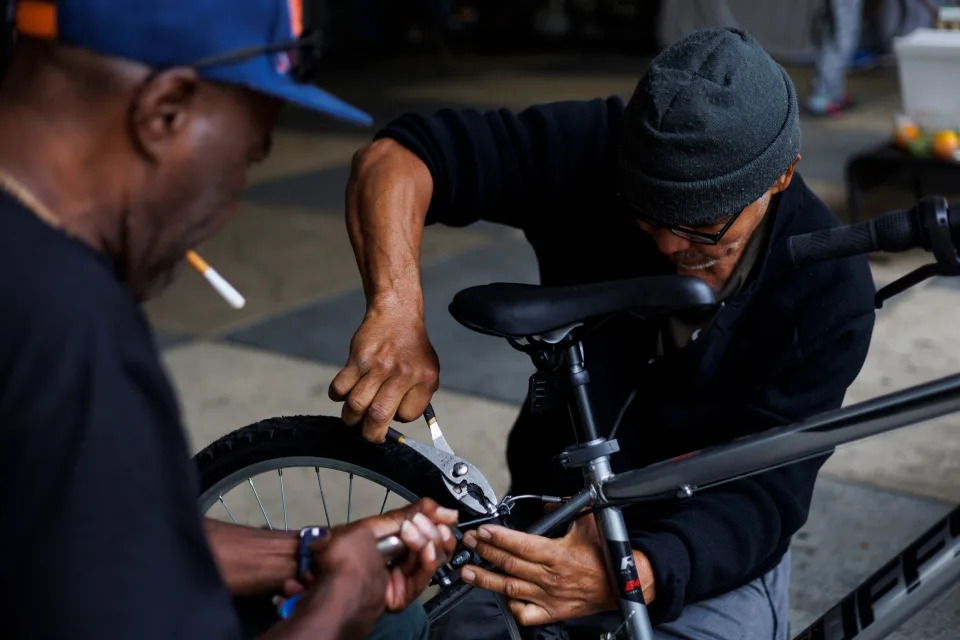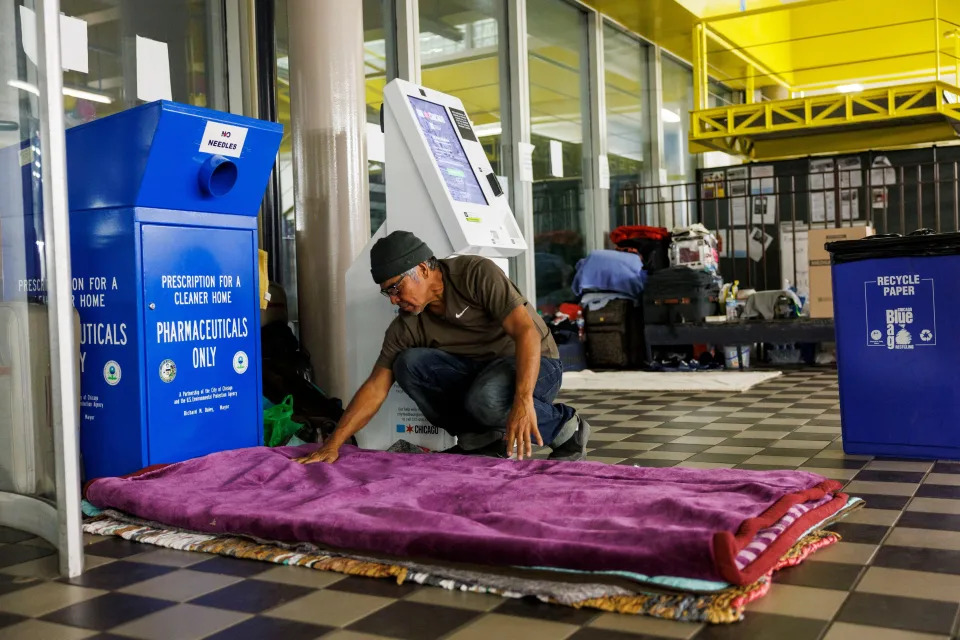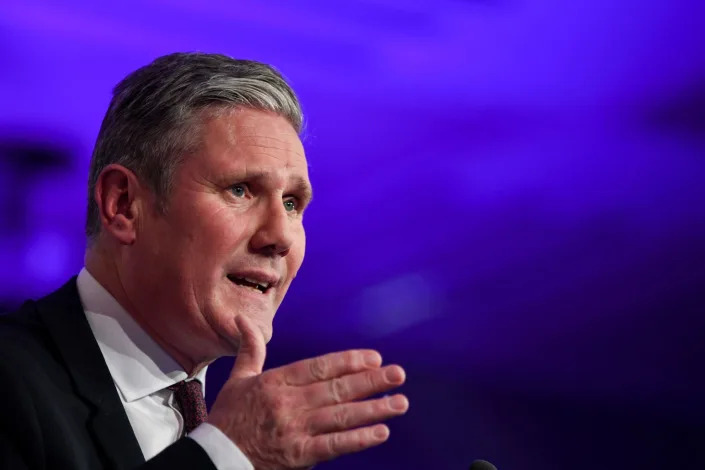Tunisia and EU sign pact to stem migration

NGO migrant rescue ships Sea-Watch 3 and Ocean Viking rescue 394 migrants in Mediterranean
Updated Sun, July 16, 2023
By Tarek Amara
TUNIS (Reuters) -Tunisia and the European Union signed on Sunday a "strategic partnership" deal that includes combatting human traffickers and tightening borders during a sharp increase in boats leaving the North African nation for Europe.
The deal follow weeks of talks and Europe's pledge of major aid to Tunisia amounting to 1 billion euros ($1.12 billion) to help its battered economy, rescue state finances and deal with a migration crisis. Most funds are contingent on economic reforms.
"It contains agreements on disrupting the business model of people smugglers and human traffickers, strengthening border control and improving registration and return. All essential measures for bolstering efforts to stop irregular migration," Dutch Prime Minister Mark Rutte said on Twitter.
The European Commission chief Ursula von der Leyens said the bloc will allocate 100 million euros to Tunisia to help it combat illegal migration. The deal promotes macro-economic stability, trade and investment, green energy transition and legal immigration.
Thousands of undocumented African migrants have flocked to the city of Sfax in recent months seeking to head for Europe in traffickers' boats, amounting to an unprecedented migration crisis for Tunisia.
"We are very pleased, it is a further important step towards creation of a true partnership between Tunisia and the EU, which can address in an integrated fashion the migration crisis," Italian Prime Minister Giorgia Miloni said.
Meloni, whose country has suffered a sharp increase in immigration boats, said that there would be an international conference on migration in Rome next Sunday with a number of heads of state, including Tunisian President Kais Saied.
Some 75,065 boat migrants had reached Italy by July 14 against 31,920 in the same period last year, official data showed. More than half left from Tunisia, overtaking Libya, which has traditionally been the main launchpad.
Saied said this month his country would not become a border guard for Europe.
(Reporting by Tarek Amara, Additional reporting by Crispian Balmer in Rome and Anthony Deutsch in Amesterdam, Writing by Tarek Amara and Hatem MaherEditing by Andrew Cawthorne)

NGO migrant rescue ships Sea-Watch 3 and Ocean Viking rescue 394 migrants in Mediterranean
Updated Sun, July 16, 2023
By Tarek Amara
TUNIS (Reuters) -Tunisia and the European Union signed on Sunday a "strategic partnership" deal that includes combatting human traffickers and tightening borders during a sharp increase in boats leaving the North African nation for Europe.
The deal follow weeks of talks and Europe's pledge of major aid to Tunisia amounting to 1 billion euros ($1.12 billion) to help its battered economy, rescue state finances and deal with a migration crisis. Most funds are contingent on economic reforms.
"It contains agreements on disrupting the business model of people smugglers and human traffickers, strengthening border control and improving registration and return. All essential measures for bolstering efforts to stop irregular migration," Dutch Prime Minister Mark Rutte said on Twitter.
The European Commission chief Ursula von der Leyens said the bloc will allocate 100 million euros to Tunisia to help it combat illegal migration. The deal promotes macro-economic stability, trade and investment, green energy transition and legal immigration.
Thousands of undocumented African migrants have flocked to the city of Sfax in recent months seeking to head for Europe in traffickers' boats, amounting to an unprecedented migration crisis for Tunisia.
"We are very pleased, it is a further important step towards creation of a true partnership between Tunisia and the EU, which can address in an integrated fashion the migration crisis," Italian Prime Minister Giorgia Miloni said.
Meloni, whose country has suffered a sharp increase in immigration boats, said that there would be an international conference on migration in Rome next Sunday with a number of heads of state, including Tunisian President Kais Saied.
Some 75,065 boat migrants had reached Italy by July 14 against 31,920 in the same period last year, official data showed. More than half left from Tunisia, overtaking Libya, which has traditionally been the main launchpad.
Saied said this month his country would not become a border guard for Europe.
(Reporting by Tarek Amara, Additional reporting by Crispian Balmer in Rome and Anthony Deutsch in Amesterdam, Writing by Tarek Amara and Hatem MaherEditing by Andrew Cawthorne)
EU, Tunisia sign 'strategic' deal on migration, economy
Francoise Kadri
Sun, July 16, 2023

European Commission chief Ursula Von der Leyen shakes hands with Tunisian President Kais Saied after announcing a strategic deal with Tunis on economic development and irregular migration (-)
The European Union and Tunisia on Sunday signed a memorandum of understanding for a "strategic and comprehensive partnership" on irregular migration, economic development and renewable energy.
The deal, which includes financial assistance, came as Tunisia has been under fire over its treatment of migrants since February, after President Kais Saied accused "hordes" of migrants from sub-Saharan African countries of a "plot" to change the country's demographic makeup.
The cash-strapped North African country, a key route for migrants trying to make their way to Europe, has since seen a rise in racially motivated attacks.
Tensions came to a head after a Tunisian man was killed on July 3 in an clash between locals and migrants in the city of Sfax.
Since then, hundreds of migrants fled their homes in Tunisia or were forcibly evicted and driven to desert areas along the borders with Algeria and Libya, left to fend for themselves in searing heat.
Speaking at the Tunisian presidential palace, European Commission President Ursula von der Leyen said Sunday's accord aims to "invest in shared prosperity".
"We need an effective cooperation, more than ever" on migration, von der Leyen said, announcing greater cooperation against "networks of smugglers and traffickers" and in search and rescue operations.
She was accompanied by Italian Prime Minister Giorgia Meloni and her Dutch counterpart Mark Rutte, who were all in Tunisia in June for talks on ways to curb irregular migration.
- 'Unlimited generosity' -
Tunisia lies about 130 kilometres (80 miles) from the Italian island of Lampedusa, and has long been a departure point for migrants risking perilous sea journeys on makeshift boats in hopes of reaching Europe.
The International Organization for Migration has said 2,406 migrants died or disappeared in the Mediterranean in 2022, while at least 1,166 deaths or disappearance were recorded in the first half of 2023.
Meloni on Sunday welcomed "a new and important step to deal with the migration crisis", and invited Saied to an international conference on migration on July 23.
Rutte said both the European Union and "the Tunisian people" stand to benefit from the agreement, noting that the EU is Tunisia's biggest trading partner.
The deal also covers financial aid to schools in Tunisia and renewable energy initiatives.
Saied meanwhile called for a "collective agreement on inhuman immigration and (forced) displacements of people by criminal networks".
He insisted that Tunisia "gave the migrants everything it can offer with unlimited generosity".
Hours before the announcement, AFP correspondents at the Tunisian-Libyan border saw dozens of exhausted and dehydrated migrants in a desert area, claiming they were taken there by Tunisian authorities.
In June, von der Leyen had offered Tunisia 105 million euros (around $115 million) to support measure to curb irregular migration and 150 million euros in immediate support, as well as a long-term loan of around 900 million euros.
- IMF loan 'diktats' -
But the long-term loan would be contingent on approval of the nearly $2 billion loan currently with the International Monetary Fund, that has stalled over differences with Saied, who assumed near total governing powers since 2021.
Von der Leyen said the EU remains "ready to support Tunisia" and provide the funds "as soon as the necessary conditions are met".
But Saied has repeatedly rejected what he calls the "diktats" of the IMF before a loan is granted, even as the country struggles under crippling inflation and debt estimated at around 80 percent of its gross domestic product.
On Sunday, Saied stood his ground saying he rejects IMF demands to lift subsidies on basic products and services, namely oil and electricity, as well as the restructuring of 100 state-owned firms.
"We must find ways to cooperate outside the framework of monetary institutions that were set up after the second world war," he said.
- Stuck in the desert -
Earlier on Sunday, Libyan border agent Mohamad Abou Snenah told AFP near the Tunisian border that "the number of migrants (coming from Tunisian) keep rising every day," adding that his patrol had so far rescued 50 to 70 people.
Ibrahim, a Congolese migrant who used to live in the Tunisian city of Zarzis, told AFP he was stopped on the street on his way back from work.
"They dropped us in the desert," he said. "We've been in the desert for many days."
Tunisian rights groups said on Friday that between 100 and 150 migrants, including women and children, were still stuck on the border with Libya.
The Tunisian Red Crescent said it has provided shelter to more than 600 migrants who had been taken this month the militarised zone of Ras Jedir on the Mediterranean coast.























.jpg)

